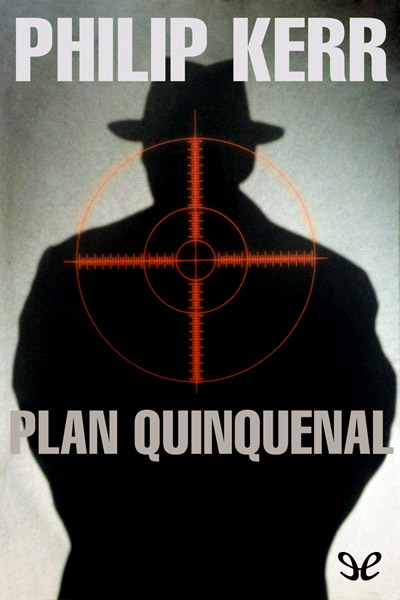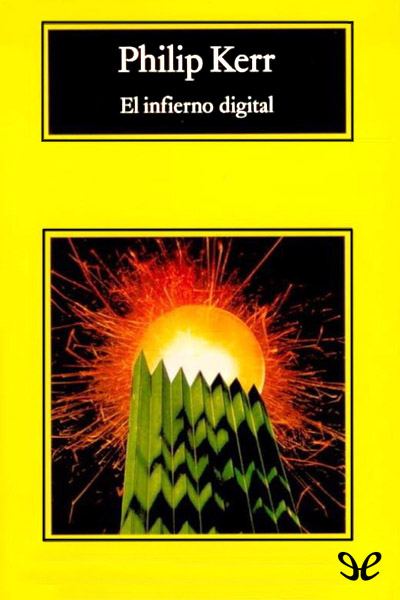oleebook.com
The Second Angel de Philip Kerr
de Philip Kerr - Género: English
Sinopsis
SUMMARY:
Philip Kerr applies his smart, suspenseful thriller style to science fiction in The Second Angel. In 2069, Earth is devastated by climate change, killer plagues, and scarce resources. P2 is a deadly (but curable) virus that infects almost the entire population. The cure is clean blood, which is in critically short supply and is affordable only to the very rich, who live in protected enclaves and engage in market speculation on the price of the vital fluid. On the moon, sex hotels and high-security prisons share turf with the First National Blood Bank, where uncontaminated blood is kept. Enter Dana Dallas, a crack security systems designer and member of the wealthy, healthy elite. When he finds out his infant daughter needs clean blood to survive, he starts a chain of events that will make him the sworn enemy of some very dangerous people. Dallas teams up with several shady characters to try and break the bank, and Kerr sprinkles the text with "historical" footnotes to help the reader understand the social context of the action. A mostly annoying narrator--part of a badly connected subplot-- explains the immunological and social importance of blood. While Kerr's ideas and plotting are terrific, his execution is rather stilted. A thug who says things like, "I believe that meaning can be established. Yes, I think it was Sir Karl Popper who said that," might have been a funny character--if everyone else in the book didn't talk that way. --Therese Littleton
Descargar
Descargar The Second Angel ePub GratisLibros Recomendados - Relacionados
Reseñas Varias sobre este libro
The concept is good: in the future, an incurable virus infects the blood of ninety percent of the population. Blood transfusions are only from your own stock and clean blood has become the most valuable commodity. Only the rich can afford to be cured of the virus; everyone else dies a slow death over a decade or so. Dallas, the designer of security for blood banks (the most secure facilities in the world) has a sick kid. This makes him a security threat, and the heartless corporation kicks him out. Dallas decides to have his revenge by robbing the blood bank.
The payoff to the book is good. If only it didn't go on for so long: I had to skim large sections. Also, Kerr did not get the memo about avoiding info-dumps: he revels in them. Whole sections explain the workings of blood, physics, economics, whatever. And footnotes explaining things both real and future. Sigh.
I never really see the dystopian society, which is a serious disappointment. Kerr tells me many times that people live in poverty, that crime is rampant, but I never get to see it. The characters are not particularly compelling, either. In fact, I didn't really care about any of them until the actually robbery was underway, in the last ten percent of the book. It's a good ending, it just needs a better book in front of it.3 s Garrie FletcherAuthor 6 books5
Terrible. I'm a huge fan of his Bernie Gunther series and was really looking forward to reading Kerr's take on sci-fi, I was hugely disappointed. Around page 30 or so I threw in the towel. I really tried to give it a chance but there were footnotes on every page, some of which were longer than the actual text. Obviously every author does a certain amount of research and back story for their characters and plot but as a reader I really don't need to see any of that unless it adds to the story, which this didn't. Save yourself a lot of time and effort and avoid this the plague or convoluted blood disease... science-fiction2 s Rowland Pasaribu376 79
Philip Kerr was, once, included in a Granta magazine collection of "Best Young British Novelists" -- and rightly so. His early thrillers, set around World War II in Germany and Austria (March Violets, The Pale Criminal, and A German Requiem), were excellent and well-written additions to the genre. A Philosophical Investigation was a new turn, his highest accomplishment, mixing his philosophical concerns with a decent mystery/thriller story. Then, instead of climbing to new heights, he plummeted.
The spectacularly incompetent Dead Meat marked the way -- turned into a TV movie, Kerr had not found the light (only darkness), but he did find the cash, raking in ever increasing sums. Gridiron (published in the U.S. as The Grid -- always be wary of books published under different titles abroad !) tells the story of a "smart" building, the stuff of half a dozen made for TV movies. Kerr adds some nifty cosmological spins, but it is still a disappointment. Sadder then was to see his next subject matter -- the yeti, in Esau. We could not bring ourselves to read A Five-Year Plan, which also sounds ... predictable.
Why so much space about the author's previous books ? Oh, because the man has or had talent, and he wastes it away and it is such a sad sight to see. The Second Angel again suggests what he is capable of, without ultimately satisfying much of that promise.
The Second Angel is a thriller, set in the year 2069. A terrible plague infects large segments of mankind, their blood tainted with a virus not dissimilar to HIV but far more widespread and considered more dangerous. Blood has become the most important substance on earth (and beyond), worth more than its weight in proverbial gold. The uninfected keep separate from the infected, who always pose a threat to them.
In an unusual twist of irony one of the central characters, Dallas, a healthy designer of blood banks (whose main task is to make them secure), has a daughter who suffers from a genetic blood disease. It can be treated, but since treatment involves blood transfusions, it is prohibitively expensive. With Dallas needing access to a great deal of money (or blood) he becomes a security risk to his company, setting the "thriller" aspect of the book into motion.
It is a truly pedestrian thriller, with more unly turns of events than anyone can be expected to believe. The rationale for what Dallas' company wants to do to him at various turns is never reasonably explained, and Dallas' reactions are similarly unly. All this leads up to a spectacular attempt at a bank heist -- a blood bank heist, of course, at a blood bank on the moon, no less. All of this is a lot to wade through, and because the actions are so unbelievable much of the pleasure of the book is undermined by this ridiculous story.
There is, however, some pleasure to be had in the book. Kerr is very good with his science, and he manages to stuff a lot into this book. The endless explanatory footnotes (there are dozens of them) are not an ideal way to relate this information, but Kerr paints a largely interesting and plausible picture of what the future will look , with nanotechnology and global cooling (bonus points for catching onto that consequence of global warming !) and whatnot. His vision of what virtual reality will lead to, and his ideas for the blood-bank security systems (Dallas' area of expertise) are entertaining and fun.
Kerr is also after bigger things. The title, Esau, is biblical in origin (always a bad sign in a book), and with a mysterious omniscient narrator who remarks upon events on occasion Kerr treads in dangerous waters. Let it be said that we were very satisfied with who/what this narrator turns out to be, and the final explanation is entirely satisfactory (and well done -- many books have tried the same and not pulled it off as well). That said, however, we also note that it is reminiscent of The Grid ...
One great weakness is the blood-centered aspect of the book. While it makes for a nice, vivid image, and while the final payoff is almost worth all this harebrained nonsense, Kerr did not ultimately sell us on it. He tries to explain, but how a commodity (blood) that can be grown almost at will should become so precious is never satisfactorily explained. Similarly, the fact that the terrible disease is curable, but that the costs of curing it are still too high to do so on a large scale, are also not convincing. In the end it is perhaps that Kerr tries so very hard to make us believe all this that undermines his arguments.
Once or twice there are literary flashes that brought a smile to our faces, but his way with words has been weighed down. The Crichton comparison seems evermore on the mark (and an ugly mark that is). The Second Angel is a decent beach-thriller, frustrating because there are many sound ideas in and behind it, but it is framed in this terrible, often cartoonish thriller story.
For those who are not demanding in the quality of the writing they read, and those who want a carefully thought-through vision of the future and are willing to forgive a B-movie plot we recommend the book whole heartedly. For others we recommend it only with great reluctance.
1 Laura364
It's a perfectly fine dystopian tale; this author just has a penchant for characters who come across as hardboiled caricatures. Yes, yes. Who's a manly man? Is it you? Is it YOU?
(Hint: it is everyone.)1 Michel Meijer322 1 follower
Story was not coherent. It starts a man's mission to save his family, which was fine and nice to read, being 3 starrish. But at the end the books takes a sharp right turn and we get some unnecesary AI simulation of the heist to come out of the blue, followed by the real robbery, but with many twists (telekinesis, and philosphical sub narratives). Finally, the book ends up with some holistic viral AI infection completely out of the blue and very disconnected to the first chapters.
The author has some love of footnotes, explaining all the nitty gritty scientifc details. Totally annoying, unnecesary and spoiling the read. Two stars.1 Dark-Draco2,242 41
This is a SF author that I haven't read before, but I really enjoyed this book. It is set in a future where most of the population are suffering from a deadly virus, that hides in the bloodstream and slowly kills. Only a few unaffected elite live in luxury, trading litres of their healthy, donated bllod as we trade stocks and shares. Dallas is one of those, but when he finds out his daughter is dying of a disease that will bankrupt him to cure and his bosses kill his wife and chld to hide that matter, he decides to get his revenge by robbing the largest blood bank. The high security facility is on the moon, but Dallas has the upper hand - he designed the place!!
This was a great read, although it was quite easy to spot who the omnipresent narrater actually was. I thought the ending was fantastic. My one critiscm was that I can't honestly see this world existing, when a single blood tranfusion could cure a person, but maybe I'm being too critical - it is SF after all!favorites science-fiction1 Matthew1,221 9,573
I had high hopes for this based on the description, but the summary was way better than the actual book. Too many foot notes, too much rambling science, too much bizarre philosophy, too many coincidences, too many unbelievable storylines. I mean, sci-fi is supposed to be about science and unusual space-based storylines, but it just didn't work here. Also, all the narrator chapters rambled on and broke up the pace of the story.
I would have a hard time recommending this to anyone.2015 least-favorite medical-thriller ...more Brian Williams8 7
This was a terrible sci-fi book. It's one thing to make up science that doesn't exist, it's quite another to get existing science totally wrong. The story and characters weren't terribly memorable or interesting and the blood bank heist plot was poorly done as well. Skip it.1 grundoon623 12
Next up in the Kerr stand-alones, a sci-fi thriller of sorts, but really a (surprise, surprise)... caper. Well, actually a bit more two books a whole lot of setup set in a future in which blood is the most precious commodity due to rampant HPV infection, then finally the caper. Well, actually no, penultimately the caper, and then finally the sub-genre classifying bit I can't tell you. You will learn (or gloss over) a hell of a lot about blood, and the narrator breaks the 4th wall with frequency, and it wouldn't surprise me if it approaches 10% of the total text that is footnote. Yet as I turned the final of seemingly way too many pages that repeatedly approached completely falling apart, about all I could think was "I can't believe he pulled that off". Bravo. I've been waiting many novels for him to achieve his potential. BrianAuthor 2 books12
Blood: too much bad blood because of plagues, viruses. Blood is worth big bucks. An ex-star designer of blood banks and security systems decides to rob the big bank on the Moon, only to discover, after he and his gang successfully pull off the heist, that the supercomputer at the heart of the bank has set him up--for an evolutionary leap. Not one of Kerr's best, this is from his middle period when he was trying to write thrillers. Go for Bernie Gunther! Marleena Lopizzo30 1 follower
4.5 ? A thoroughly enjoyable novel written in 1988 largely based on the moon. Loved comparing the style of writing to novels nowadays. Best read by those over 40, otherwise some nostalgic bits will go over your head. Stirred up some memories of the pre 2000s. Not the best written or foolproof of stories, but if you're looking for a sci-fi walk down memory lane give it a go.
The ending was pleasantly unexpected, Dallas's AI assistant changes the course of their trajectory so they won't return to earth, off to start a new population somewhere else without the crew knowing.This entire review has been hidden because of spoilers.Show full review Rich A53
A heist story set in the future with a pretty good twist at the end. Luna Leda85
Ingeniosa Paulo Goulart81
Interessante. Muito interessante o quão bem o autor perspectivou o futuro (parecido com o actual presente) em várias coisas, até na pandemia viral... Aaron193 7
A one armed man and a quantum computing engineer walk into a blood bank... Bradley Brill243 1 follower
Just not for me. Kevin5
ugh Francois Vinette345
Très bon polar Althea Ann2,240 1,122
This book has been hyped as being Michael Crichton in style.
I can see that - it's a near-future medical/heist/cyber/murder thriller that relies heavily on the author's 'scientific' theories.
However, where Crichton interviews scientists, and then ignores what they tell him (either to make a good story or to further his own political agenda, depending on who you believe... see:
http://www.realclimate.org/index.php?... ) it seems that Kerr hasn't bothered to actually talk to any scientists at all, instead making it all up as he goes along.
I'm not going to get into all the scientific and medical inaccuracies of the book - if you're interested, a doctor reviewed it on amazon.com, and caught many more of the problems than I did. If such things bother you, this book is not for you.
At the outset of the book, in 2069, our protagonist, Dallas, is a successful, wealthy executive. He and his family are free of the P2 virus, a blood disease that most of the world's population has. P2 can be cured by a full blood transfer, replacing the body's blood with healthy blood. Healthy blood transfusions can also help one live longer. Unfortunately, this situation has made blood the new 'gold standard' of civilization, artificially raising prices so that only the very wealthy can afford such treatments.
It's just Dallas' bad luck that his daughter turns out to have an unrelated, genetic blood disease that will require her to have repeated blood transfers if she is to live. When his corporation finds out the situation he's facing (potential bankruptcy and desperation from paying for blood for his daughter), they no longer trust him, and decide to have him and his family assassinated. His wife and child are killed, but the assassin misses him.
Angry and without a job, Dallas decides to turn to a life of crime, and makes plans to rob the world's largest blood bank (actually, it's on the Moon).
Most of the book concentrates on this heist (aided by virtual reality sims. )
Not much energy is devoted to Dallas' loss of his family; it's just an excuse to get into the action.
Kerr obviously intends a deep musing on the powerful symbolism of blood, and so we don't miss that, he introduces a 'narrator' device which keeps popping up (in italics) to comment on the action or insert (totally unnecessary) footnotes. Some people might find this clever or fun, I just thought it interrupted and detracted from the story. The 'identity' of the narrator is also supposed to be a secret/surprise, but I figured most of it out pretty early on.
I'd previously read the omnibus edition of 3 of Kerr's crime/mystery novels, Berlin Noir, and was much more favorably impressed by those. Science-based SF just isn't this author's forte, in my opinion. James Henderson2,097 162
With this dystopian science fiction thriller that has a focus on ideas as well as action Philip Kerr has come up with a core premise that allows him to combine the science fiction and "sophisticated thriller" genres. The Second Angel takes place in 2069. Humanity has been divided into two groups as a result of the blood virus known as P2, which has infected some 80 percent of the population. Uninfected blood has replaced gold as the standard upon which the world's currencies are based. It is a nice idea with potential. However The Second Angel is marred with a weak plot that could have (and should have based on Kerr's previous work) been better. The result is that I found The Second Angel frustrating when it should have been exhilarating. It's a "fast-paced, sophisticated thriller" that could have used some restraint in terms of its science fiction presentation. While I enjoy the thoughtful style of Philip Kerr he could have held to the dictum "less is more," this would have been a better book. As it is it's a great idea buried in a mediocre plot.
dystopia science-fiction Jeanne745 4
Due to blood infections, clean blood has become the currency, with healthy people separated from sick people and blood reserves stored in banks on the moon. One man, a security designer, decides to break into the biggest bank, for which he designed the security system, when his family is killed by his employers. He and a group of sick men and women succeed in stealing blood to make themslves rich and to save their lives through transfusion.
A computer that comes to itself because of the blood available to it for information, redirects them as they escape.
Was really annoying to read, due to all the footnotes and extraneous scientific information, but it's written that way because the "author"/narrator is the computer -- a system that we are told somewhere along the way, gives you way too much information. Of course, we're not told it's the computer's story until the very end. Pretty clever.This entire review has been hidden because of spoilers.Show full reviewsci-fi Paul31 23
Read THE SECOND ANGEL after A PHILOSOPHICAL INVESTIGATION. Loved it. Philip Kerr is one of my favorite authors, and my suggestion to anyone considering diving into his body of work would be to start with A Philosophical Investigation. It's a cyberpunk detective novel and utterly fantastic. Kerr, Dan Simmons, doesn't revisit the same territory very often. He leaps from genre to genre effortlessly. For this reason, be careful taking to heart what people have to say about some of his work--especially those who seem to be angry all of his books aren't exactly the ones in Kerr's repertoire that specifically took their fancy. Now, some of Kerr's novels I've enjoyed more than others, but here is a writer who has a lot to so and always does so intelligently. The Second Angel is a science fiction novel of the highest order. In very Kerr- fashion, it blends super sci-fi with Roman Noir. A very fun read indeed. Mary S103 1 follower
The birth of a self aware computer -- always an interesting topic. But, let's hope that when the machines do become aware they are nothing the self-centred, pompous, prig that this uber-intelligence turned out to be. I can't imagine having to spend quality time with that puffed up personality! I completely disd it by the time the story was over.
The other players in the story were all equally interesting, and the distopian near future certainly gave me pause to think -- I could imagine humans behaving this way (badly -- needless to say).
My only quibble was with the "humanizing" on the main characters -- they seemed the machines and the machines seemed "human". That may be one of the points that Kerr was trying to get across, but it didn't ring quite true for me. An interesting read -- just pronounce "bleep" over most of the conceited computer text. Cathleen Ash304 2 Read
It's a world where a litre of your blood would sell for 1.84 million dollars. Yes. 1.84 million. See, you don't have P2, and in the future, 80% of the people do. Oh, you might live ten to twenty years with P2, but the end would still be devastating and painful, and so not pretty. If you're wealthy, you can put the end off even longer, by buying some very expensive "clean" blood.
For Dallas, it's not about him, but his daughter. He mades a good salary, designing security systems so no one can get through, but not a good enough salary to buy his daughter the amount of blood she needs to survive P2.
The plus side? He designed the security for the First National Blood Bank. The downside? His employers know this - and are most certainly watching him.
It's an impregnable bank - but he needs what's in those vaults - he has to try. Ramon Yáñez lópez131 6
Philip Kerr es un escritor de Novea Negra ambientada en el Berl??n de la Segunda Guerra Mundial y la posguerra. Aqui se empe??a en hacer una novela "futurista" mas que de ciencia ficci??n aunque la frontera es ambigua. Digamos que para atraer a aquellos lectores que no les agrada la Ciencia Ficci??n, lastra el texto con infinidad (>100) citas a pie de p??gina con el objetivo de "justificar" todo y mas.
Como todo lo de ??l que he leido me ha entretenido y ello me hace ponerle 4 estrellas y no 3 mas que nada para premiar el esfuerzo que ha tenido al cambiar de registro. Por de pronto no estaria de mas que leyera a los clasicos, si quiere escribir otra novela del genero
Y no, no voy a desvelar el final por que es de risa, de verdad. Alien967 8
Spezialität des Autoren: praktisch jede Seite ist mit mehreren Fußnoten versehen. Das ist doof, da es einen ständig aus dem Lesefluss reißt. Außerdem sind die Fußnoten selber gar nicht sonderlich wichtig für irgendwas.
Teils ist das Buch realistisch-spannend geschrieben, teils total unglaubwürdig. Außerdem bringt er schamlos immer wieder Info-Dumps über Seiten hinweg. Und das auch noch über Themen, die er offenbar mords interessant findet, ich aber nicht so. Nach der Ankunft auf dem Mond und in der Vorbereitungsphase für den Raub, wird über Seiten hinweg über Virtuelle Realität gelabert. Abgebrochen.english quit-reading sf Reeree1,110 9
??????????????????
?????????/2008-10-29?http://rew.jp/wiki.cgi/diary?page=%C6...
http://rewjp.blogspot.com/2008/10/200...
?? ?????????????
2069???????SF???
??????????????????????????????????????
?????????????????????????????????
2069?????????????????????????????????????????????????????????
?????????????????????????????????????
???????????????
???????????????????????????2069???????????????????
???????????????????????????????????????????????????????????????????????????????0-???? 00-?? 000-sf M.132
I bought this book in 2005. It took me ten years to pick it up. Or rather, pick it up again. I did give it a go back then. But the moment the narrator went on the first long tirade, I gave up. I wasnt in a mood for such an intellectual language. My mistake.
This was a great dystopian world, and as usual human nature didnt look good in the picture. It had action, power struggles and betrayal. Revenge, adventure. And a surprising end. (No, not in the sense of who the narrator was. The surprise was... well, something else.)
dystopian science-fiction Jer232 8
Most are "so so" for this book. This was my first read from this author and I'm eager to read more. A nice blend of cyberpunkish sci-fi that goes... well... I won't spoil it. There's plenty of footnotes at the bottom of some of the pages to give you some of the facts behind the science he's using. Though I've heard that you can pick it apart, it felt well researched to me and I'm sure I learned a bit from this book in good ol Crichton style.
Meg86 11
Autor del comentario:
=================================









